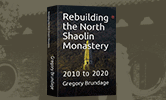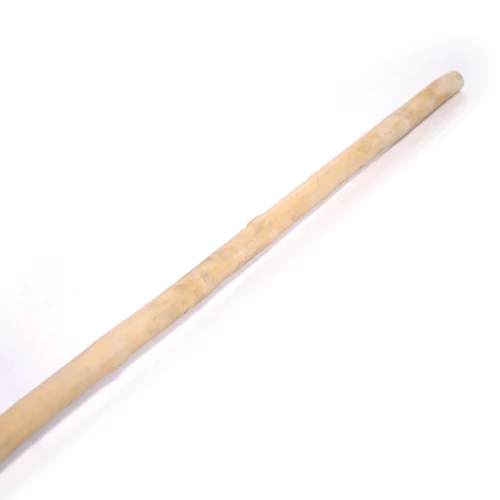 Grandmaster Pui Chan is one of the greatest martial arts pioneers of his generation. His global impact on the spread of Kung Fu cannot be denied. After immigrating to the United States, he built an empire around the practice of traditional Northern Tam Tui Praying Mantis Kung Fu, named after the venerated monastery where this style originated, the Wah Lum Temple in Shandong, China. In 1980, he established one of the first Kung Fu temples on American soils. It still stands today in Orlando, Florida. This was long before the Shaolin monks arrived here, long before they began establishing any sort of Kung Fu Temple. In fact, Grandmaster Chan led the first U.S. tour to Shaolin Temple in 1986, and was an integral coordinator of the very first Shaolin monk tour to America in 1992. Today, Wah Lum officially recognizes over thirty schools opened by Grandmaster Chan's pupils, all around the world. Chan has taught countless students, certified an untold number of masters, and established a worldwide martial legacy that is both unprecedented and inspirational.
Grandmaster Pui Chan is one of the greatest martial arts pioneers of his generation. His global impact on the spread of Kung Fu cannot be denied. After immigrating to the United States, he built an empire around the practice of traditional Northern Tam Tui Praying Mantis Kung Fu, named after the venerated monastery where this style originated, the Wah Lum Temple in Shandong, China. In 1980, he established one of the first Kung Fu temples on American soils. It still stands today in Orlando, Florida. This was long before the Shaolin monks arrived here, long before they began establishing any sort of Kung Fu Temple. In fact, Grandmaster Chan led the first U.S. tour to Shaolin Temple in 1986, and was an integral coordinator of the very first Shaolin monk tour to America in 1992. Today, Wah Lum officially recognizes over thirty schools opened by Grandmaster Chan's pupils, all around the world. Chan has taught countless students, certified an untold number of masters, and established a worldwide martial legacy that is both unprecedented and inspirational.
His daughter, Mimi Chan, has just made a documentary on her father titled, PUI CHAN: KUNG FU PIONEER. A talented martial artist herself, Mimi appeared with her father on the June 2000 issue of Kung Fu Tai Chi. Mimi stands among the ranks of an impressive group of actresses including Cheng Pei Pei, Zhao Wei and, coming soon, Jamie Chung, and maybe ever Zhang Ziyi. All these distinguished actresses have portrayed the legendary Chinese warrior woman, Mulan. In 1998, Mimi's Wah Lum moves were mo-capped for the best known American version, Disney's Mulan. How many martial artists can genuinely claim to be a Disney princess? But that was years ago. Since then, Mimi has kept active in film work and has never relented in her Kung Fu practice. She has written for KungFuMagazine.com and this year served as one of the guest interviewers at KUNG FU TAI CHI 20 YEARS.
PUI CHAN: KUNG FU PIONEER debuted at CENFLO, the Central Florida Film Festival, over Labor Day Weekend 2012 where it captured awards for both Best Documentary and Audience Choice. We had the chance to catch up with Mimi Chan to chat about her new work.
GC: From Mulan to moviemaker - tell us how that happened.
MC: I always had it in my head that my father's story really needed to be shared. Whenever we're on trips to China or whenever we meet new people, they are always really fascinated by him. He really does have a magnificent journey. And I've always had it in my head that I wanted to document it and share it. So I've actually been compiling footage for as long as I can remember. Since 2007, I really started to catalog everything he did. And I aggressively, in 2010, put out a very small informal film for just the Wah Lum family. It was a springboard for me, moving forward into making a full-on documentary for the mainstream public. I just really want to share his story and his gift, everything he's contributed to martial arts in addition to having everyone understand what he's gone through in order to get where he is now.
GC: What was your father's reaction to your idea to make this film?
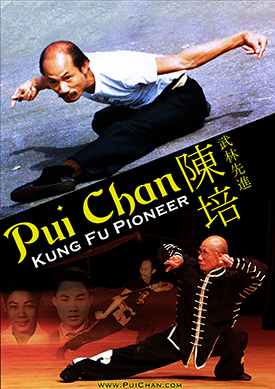 MC: I think he was at first a little leery, because he does not sit still for very long. You've met him.
MC: I think he was at first a little leery, because he does not sit still for very long. You've met him.
GC: Of course.
MC: (laughs) He does not take more than one "take." At first, he was kind of irritated that I was following him around with a camera all the time. But he understood. I explained to him that it's a historical thing. A lot of the things he has done have been milestones in terms of martial arts in America. And even in China, whenever we go there, the importance that he has on the art is really significant. And so I explained to him that I really need to do this for the history, you know? And he kind of got that, but after the 2010 home video showing - we celebrated our 30th anniversary in Orlando and we rented a theater and just did our own thing, with just our family and friends, the Wah Lum family - and he was thrilled. And that is another reason why I decided to go full-on out, because he pushed me to do it. He wanted to share it with everyone because he was so proud of what he saw on screen.
So the second time around - because I did reshoot interviews and brought everything up to date - I filmed it on the Canon 5D Mark II so the footage is really rich, like film. The second time, he kind of sat still. Whereas the first time, he would go, "Are we done? Are we done?" after like ten minutes. It was a challenge, but then, after he saw the 2010 movie, he was really ecstatic. And this time around has been very accommodating in terms of being captured on film. I think he saw that it could really be something amazing. He had no idea what to expect at first, but both my parents were really proud and really excited about the film.
GC: I remember reading your mom's book, (Tai Chi World of Suzy Chan), and discovering she has a fascinating story as well. How much does she enter into your documentary?
MC: She's one of the main interviews. She's obviously a big part of his life. The documentary would be more of a mini-series if I were able to cover every facet of their lives. So I couldn't do that in terms of a final cut. You just have to take what the main things - how they met and her journey with him when she became his wife and part of the school, because she's a cornerstone of the school as well. Wah Lum definitely would not be where it is today without my mom and her English skills and her support. No man does it alone. And that's also a tone of the film where he knows that although he's done a lot personally, he knows that it's constant support by family, friends and, of course, his wife.
GC: How did you finance this production?
MC: It's self-financed (laughs), which is a challenge. But you know, this thing I really believe in. I did my best with the budget I had.
GC: What was the most surprising thing you found out about your father?
MC: I always gravitate back to the most "impact" things. We knew he grew up and he was poor and there were hardships, but the details of what he had to endure as a child always surprises me. However, I did find out a lot of things that I've misinterpreted over the years. I saw he went to one of the cities in Africa; I had the name completely wrong. Even on the first film, I had it wrong. Every time I went through to sit with him, I would learn so much more about him. Even after my final cut, I learned more things about him. I feel like, like I said, it could be a mini-series, because it's an endless, endless story and journey and there's so many details. But really, what impacts me the most is how much he had to go through as a really young child in China. For some one that young - you hear about these war stories, you hear about poverty and the communism and how horrible it was; but when you hear about it from someone as close as my dad is to me, it's really heart-wrenching. That always has the biggest impact on me.
GC: Did you ever feel like you were too close to the subject to remain unbiased?
MC: I sometimes felt that I was too close to the subject in terms of wanting to show every detail. I keep going back to, "What parts do I take out?" I had to put myself in the mind of a mainstream NON-martial arts practitioner and what would they find interesting and relevant to this story. Because of course I couldn't tell everything, but I wanted to tell this story that wouldn't just reach Kung Fu lovers and people who personally know my father, but that could reach and relate to everybody. That was probably the hardest aspect because I am a martial artist. I am his daughter. And I'm very close to the subject. So I think the biggest thing was that I had an actual script, but I went through and had writers who helped out and we revised and play Devil's advocate on every turn on what was going to be the most relevant and easy to relate - the human spirit of a martial artist. Because all martial artists are going to love this film (laughs). It celebrates Kung Fu. It celebrates hard work and ethics and all of the traditions that we're taught as martial artists. I feel like, on another level, everybody can enjoy the film because of the way I have him portrayed. It's not just about Kung Fu.
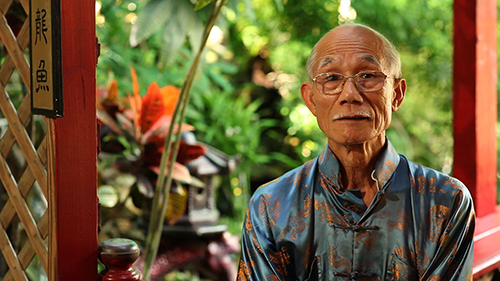
GC: I always wrestle with being a martial artist trying to speak to non-martial artists too. And my martial upbringing isn't near as intensive as yours. How did you step outside of being a martial artist and try to be a normal person? (laughs)
MC: (laughs) Yes, I understand. I'm definitely not a normal person. You know, I think what really helped me was some of my experience outside of Kung Fu. I kind of gravitated towards my non-martial arts friends and people that I've met, like when I did a brief stint in L.A. I kind of understood the movie business from that aspect. I auditioned for non-martial arts things. I got exposed to - from a filmmaker's perspective - what is interesting on a human level - how to tell a story - the basics of filmmaking. I did learn a lot while I was out there and I also had to learn how to talk to people that had no clue about martial arts. So it gave me a sense of how to explain things very simply, without going into an immense amount of detail and lineage and, you know, all the things that we gravitate towards and want to talk about because we're so enthusiastic about it. But I also had a lot of really great friends that work in the industry that were my advisors. I would pick their brain. Again, like everything, I didn't do it all alone. I was able to get a lot of support from people, filmmakers that I really admire and people that I've had the pleasure of working with and the opportunity to work with that aren't martial artists themselves. So I did consult with people and get a lot of outside support as well.
GC: What do you hope audiences will come away with after seeing your film?
MC: My goal was for him to have the same impact I see whenever he meets anyone, whether it's a waiter at a restaurant that doesn't know him, whether it's an avid fan that's so excited to meet him - I've been told it's like meeting one of their idols, that they've looked at Kung Fu Magazine from the past. I've seen him meet so many people and have the same impact. And so I wanted to share that globally. I want him to be appreciated, but I wanted his story to inspire people. It's the American dream. It's hard work. In this day and age where there are so many documentaries on controversy and politics, you turn on the news and it's just depressing. I want people to find a little inspiration. I think it would be really great if people come away from it inspired to do something they've always wanted to do, believe in their dreams, follow through and work hard, and feel really good at the end of the film. Although there were a lot of hardships, and there's ups and downs, I think everyone can relate to that. Maybe they didn't grow up in communist China, but maybe they have a loved one who's ill or maybe they've lost a job and their house. I just think that everyone can relate to hardship and coming out of it. I want people to be inspired.
GC: During the course of making this film, was there anything that you learned about your father that you regret learning?
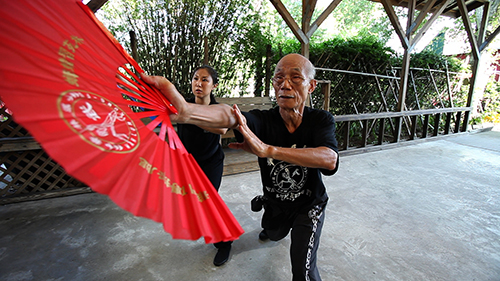
MC: Not really. You know, he has an amazing way about him and I think that's part of his success and who he is today. I've met a lot of masters that ask me or tell me why they think he's so successful or why he's been able to proliferate the art so much. It's because he really sees things very positively all the time. Even all the things that I was devastated to hear about, at the same time, he's able to be okay. So hearing about some of the things that are painful to me, recalling some of the things he saw growing up, people that weren't very honest with him and took advantage, those are the things that really bother me. They get under my skin because I'm protective over my father. But he puts a spin on it where it doesn't bother him. He's able to move on and move forward, so even all the negative things end up being positive. I'd love to do a part two and show another aspect of it because he's got so many stories to tell. I couldn't keep them all in there, but so far, so good. I haven't regretted anything.
GC: What are your plans for showing this film?
MC: My goal is to work the film festival market and hopefully I'll find a distributor. It would be fantastic to have an indie theatrical release. I know it's almost like winning the lotto, but I'm going to stay really positive. Even if it's a matter of four-walling and finding out where our fans are and people who want to see the film, I think we can still make it happen. And then after that, I think I could do the second level of distribution, which would be maybe Netflix, iTunes. I've been approached with all these different ideas from different people in the industry. I want to take my first year with it in the film festival route and see.
 GC: Film is definitely at a turning point with DVDs phasing out and VOD moving in. It's a very delicate market.
GC: Film is definitely at a turning point with DVDs phasing out and VOD moving in. It's a very delicate market.
MC: Exactly.
GC: Is it too early to talk about your next project?
MC: Yea. (laughs) No. This is technically my first feature film. So I've worked on smaller films and in-house projects for Wah Lum. I produce all of our in-house shows. But what I found with the documentary - this was my first stab at it and it's probably my favorite subject in the whole world - I find that what I enjoy is capturing an amazing story that maybe people don't know about. I have an interest in people. So I think if I were to do another one, it would be, maybe not a personal level, maybe someone I find interesting, you never know. I haven't really thought about what that next project is going to be but I think there's definitely potential for me to do another one.
GC: PUI CHAN: KUNG FU PIONEER was shown at CENFLO where it did quite well.
MC: Our world premiere was at the Central Florida Film Festival, which is really great for me. It was the first one in the timeline that I applied to and we happened to be accepted to it and it happened to be in our hometown. I'm thrilled because it's a friendly audience. I knew we were already sold out on tickets. I was pretty excited about that. It was just a great reception to have.
I have my eyes set for the future of the film. I just want to it to be out there.
GC: Everyone here wishes you all the luck for this project.
MC: Thank you, Gene.
About
Gene Ching :
![]() For more information on PUI CHAN: KUNG FU PIONEER, visit www.puichan.com. Or find the Facebook page.
For more information on PUI CHAN: KUNG FU PIONEER, visit www.puichan.com. Or find the Facebook page.
![]() Print Friendly Version of This Article
Print Friendly Version of This Article








